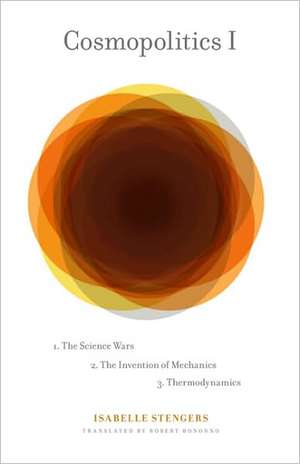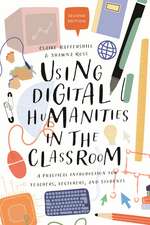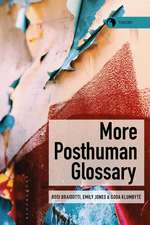Cosmopolitics I: Posthumanities, cartea 9
Autor Isabelle Stengers Traducere de Robert Bononnoen Limba Engleză Paperback – 28 iul 2010
From Einstein’s quest for a unified field theory to Stephen Hawking’s belief that we “would know the mind of God” through such a theory, contemporary science—and physics in particular—has claimed that it alone possesses absolute knowledge of the universe. In a sweeping work of philosophical inquiry, originally published in French in seven volumes, Isabelle Stengers builds on her previous intellectual accomplishments to explore the role and authority of science in modern societies and to challenge its pretensions to objectivity, rationality, and truth.
For Stengers, science is a constructive enterprise, a diverse, interdependent, and highly contingent system that does not simply discover preexisting truths but, through specific practices and processes, helps shape them. She addresses conceptual themes crucial for modern science, such as the formation of physical-mathematical intelligibility, from Galilean mechanics and the origin of dynamics to quantum theory, the question of biological reductionism, and the power relations at work in the social and behavioral sciences. Focusing on the polemical and creative aspects of such themes, she argues for an ecology of practices that takes into account how scientific knowledge evolves, the constraints and obligations such practices impose, and the impact they have on the sciences and beyond.
This perspective, which demands that competing practices and interests be taken seriously rather than merely (and often condescendingly) tolerated, poses a profound political and ethical challenge. In place of both absolutism and tolerance, she proposes a cosmopolitics—modeled on the ideal scientific method that considers all assumptions and facts as being open to question—that reintegrates the natural and the social, the modern and the archaic, the scientific and the irrational.
Cosmopolitics I includes the first three volumes of the original work. Cosmopolitics II will be published by the University of Minnesota Press in Spring 2011.
Din seria Posthumanities
-
 Preț: 220.24 lei
Preț: 220.24 lei -
 Preț: 188.33 lei
Preț: 188.33 lei -
 Preț: 162.02 lei
Preț: 162.02 lei -
 Preț: 123.92 lei
Preț: 123.92 lei -
 Preț: 132.16 lei
Preț: 132.16 lei -
 Preț: 170.61 lei
Preț: 170.61 lei -
 Preț: 215.67 lei
Preț: 215.67 lei -
 Preț: 112.18 lei
Preț: 112.18 lei -
 Preț: 171.91 lei
Preț: 171.91 lei -
 Preț: 185.87 lei
Preț: 185.87 lei -
 Preț: 185.21 lei
Preț: 185.21 lei -
 Preț: 145.56 lei
Preț: 145.56 lei -
 Preț: 169.30 lei
Preț: 169.30 lei -
 Preț: 107.72 lei
Preț: 107.72 lei -
 Preț: 146.17 lei
Preț: 146.17 lei -
 Preț: 154.57 lei
Preț: 154.57 lei -
 Preț: 178.55 lei
Preț: 178.55 lei -
 Preț: 112.50 lei
Preț: 112.50 lei -
 Preț: 214.29 lei
Preț: 214.29 lei -
 Preț: 155.48 lei
Preț: 155.48 lei -
 Preț: 169.70 lei
Preț: 169.70 lei -
 Preț: 153.60 lei
Preț: 153.60 lei -
 Preț: 186.23 lei
Preț: 186.23 lei -
 Preț: 179.48 lei
Preț: 179.48 lei -
 Preț: 187.41 lei
Preț: 187.41 lei -
 Preț: 304.84 lei
Preț: 304.84 lei -
 Preț: 120.18 lei
Preț: 120.18 lei -
 Preț: 242.71 lei
Preț: 242.71 lei -
 Preț: 187.73 lei
Preț: 187.73 lei -
 Preț: 138.99 lei
Preț: 138.99 lei -
 Preț: 216.24 lei
Preț: 216.24 lei -
 Preț: 224.90 lei
Preț: 224.90 lei -
 Preț: 218.74 lei
Preț: 218.74 lei -
 Preț: 223.55 lei
Preț: 223.55 lei -
 Preț: 222.01 lei
Preț: 222.01 lei -
 Preț: 198.89 lei
Preț: 198.89 lei -
 Preț: 222.18 lei
Preț: 222.18 lei -
 Preț: 209.96 lei
Preț: 209.96 lei -
 Preț: 178.37 lei
Preț: 178.37 lei -
 Preț: 234.86 lei
Preț: 234.86 lei -
 Preț: 204.11 lei
Preț: 204.11 lei -
 Preț: 208.36 lei
Preț: 208.36 lei -
 Preț: 223.55 lei
Preț: 223.55 lei -
 Preț: 230.95 lei
Preț: 230.95 lei -
 Preț: 170.98 lei
Preț: 170.98 lei - 19%
 Preț: 99.50 lei
Preț: 99.50 lei
Preț: 185.76 lei
Nou
Puncte Express: 279
Preț estimativ în valută:
35.55€ • 36.98$ • 29.35£
35.55€ • 36.98$ • 29.35£
Carte disponibilă
Livrare economică 25 martie-08 aprilie
Livrare express 08-14 martie pentru 25.11 lei
Preluare comenzi: 021 569.72.76
Specificații
ISBN-13: 9780816656875
ISBN-10: 0816656878
Pagini: 272
Ilustrații: black & white illustrations
Dimensiuni: 140 x 216 x 23 mm
Greutate: 0.37 kg
Ediția:1
Editura: University of Minnesota Press
Colecția Univ Of Minnesota Press
Seria Posthumanities
ISBN-10: 0816656878
Pagini: 272
Ilustrații: black & white illustrations
Dimensiuni: 140 x 216 x 23 mm
Greutate: 0.37 kg
Ediția:1
Editura: University of Minnesota Press
Colecția Univ Of Minnesota Press
Seria Posthumanities
Notă biografică
Isabelle Stengers is professor of philosophy at the Free University of Brussels. Among her other books available in English are The Invention of Modern Science (Minnesota, 2000) and Power and Invention: Situating Science (Minnesota, 1997).
Robert Bononno, a teacher and translator, lives in New York City. His most recent translation is Psychoanalysis and the Challenge of Islam (Minnesota, 2009).
Robert Bononno, a teacher and translator, lives in New York City. His most recent translation is Psychoanalysis and the Challenge of Islam (Minnesota, 2009).
Cuprins
Preface, Book I. The Science Wars, 1. Scientific Passions, 2. The Neutrino’s Paradoxical Mode of Existence, 3. Culturing the Pharmakon?, 4. Constraints, 5. Introductions, 6. The Question of Unknowns, Book II. The Invention of Mechanics: Power and Reason, 7. The Power of Physical Laws, 8. The Singularity of Falling Bodies, 9. The Lagrangian Event, 10. Abstract Measurement: Putting Things to Work, 11. Heat at Work, 12. The Stars, Like Blessed Gods, 13. If We Could . . ., Book III. Thermodynamics: the Crisis of Physical Reality, 14. The Threefold Power of the Queen of Heaven, 15. Anamnesis, 16. Energy is Conserved!, 17. The Not So Profound Mystery of Entropy, 18. The Obligations of the Physicist, 19. Percolation, 20. In Place of an Epilogue, Notes, Index
Descriere
From Einstein’s quest for a unified field theory to Stephen Hawking’s belief that we “would know the mind of God” through such a theory, contemporary science—and physics in particular—has claimed that it alone possesses absolute knowledge of the universe. In a sweeping work of philosophical inquiry, originally published in French in seven volumes, Isabelle Stengers builds on her previous intellectual accomplishments to explore the role and authority of science in modern societies and to challenge its pretensions to objectivity, rationality, and truth.
For Stengers, science is a constructive enterprise, a diverse, interdependent, and highly contingent system that does not simply discover preexisting truths but, through specific practices and processes, helps shape them. She addresses conceptual themes crucial for modern science, such as the formation of physical-mathematical intelligibility, from Galilean mechanics and the origin of dynamics to quantum theory, the question of biological reductionism, and the power relations at work in the social and behavioral sciences. Focusing on the polemical and creative aspects of such themes, she argues for an ecology of practices that takes into account how scientific knowledge evolves, the constraints and obligations such practices impose, and the impact they have on the sciences and beyond.
This perspective, which demands that competing practices and interests be taken seriously rather than merely (and often condescendingly) tolerated, poses a profound political and ethical challenge. In place of both absolutism and tolerance, she proposes a cosmopolitics—modeled on the ideal scientific method that considers all assumptions and facts as being open to question—that reintegrates the natural and the social, the modern and the archaic, the scientific and the irrational.
Cosmopolitics I includes the first three volumes of the original work. Cosmopolitics II will be published by the University of Minnesota Press in Spring 2011.




























